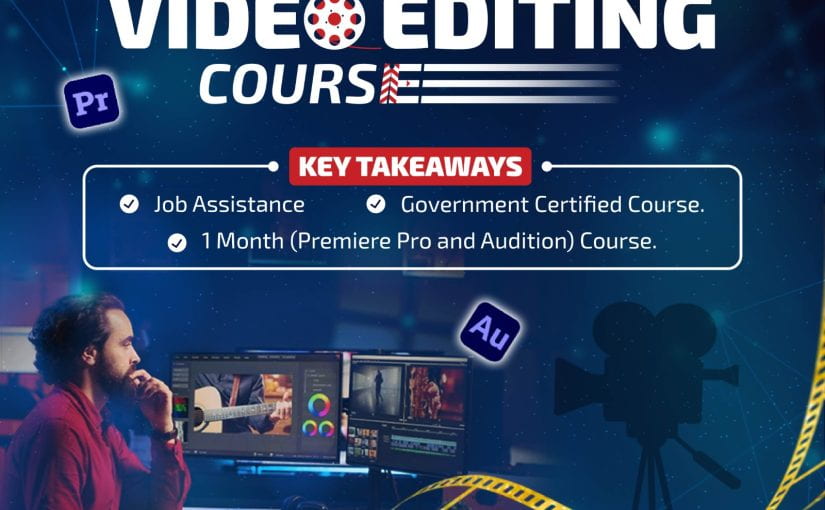Breaking into the visual effects (VFX) industry after completing your VFX course can be both exciting and challenging. With the right strategies and preparation, you can increase your chances of landing your first job in this dynamic field. Here are some essential tips to help you navigate the job market and find your first VFX position after graduating from a VFX Institute.
1. Capitalize on Your Education from a VFX Institute
Your education at a VFX Institute has provided you with a solid foundation in visual effects. Whether you attended a specialized VFX course or participated in hands-on VFX classes, make sure to leverage this knowledge in your job search. Highlight the skills and techniques you’ve learned, such as 3D modeling, animation, and compositing, which are critical in the VFX industry. Employers value candidates who can effectively apply what they’ve learned from their visual effect course to real-world projects.
2. Create a Compelling Portfolio
A well-crafted portfolio is crucial when applying for VFX jobs. Ensure your portfolio showcases a diverse range of skills and projects from your VFX classes and any additional work you’ve done. Include examples of your best work from your visual effect course, such as animations, visual effects sequences, and any freelance or personal projects. A strong portfolio demonstrates your ability to tackle various challenges and your proficiency in visual effect design.
3. Network Within the Industry
Networking is a powerful tool in the VFX industry. Use the connections you’ve made through your VFX Institute and VFX classes to your advantage. Attend industry events, join professional groups, and participate in online forums dedicated to visual effects. Engaging with industry professionals and fellow graduates can provide valuable insights, job leads, and recommendations. Networking helps you stay informed about job openings and trends in visual effect design.
4. Gain Practical Experience
Experience is essential in the VFX industry. Look for internships, freelance opportunities, or entry-level positions that allow you to apply the skills you acquired from your VFX course. Many VFX Institute programs offer internship placements as part of their curriculum, which can be a great starting point. Hands-on experience helps you build your resume, develop your portfolio, and understand the workflow and expectations in a professional setting.
5. Stay Updated with Industry Trends
The field of visual effects is constantly evolving with new technologies and techniques. To remain competitive, stay updated with the latest industry trends and software developments. Follow industry news, subscribe to relevant publications, and participate in workshops or additional VFX classes if possible. This ongoing education ensures that your skills are current and aligned with industry standards.
6. Apply for Entry-Level Positions
When searching for your first VFX job, focus on entry-level roles that match your skill set. Positions such as junior VFX artist, production assistant, or assistant compositor are great starting points. Tailor your resume and cover letter to highlight your education from a VFX Institute, as well as the specific skills you developed in your visual effect course. Emphasize how your experience in visual effect design has prepared you for the role.
7. Utilize Job Boards and Professional Websites
Job boards and professional websites are valuable resources for finding VFX job openings. Websites like LinkedIn, Indeed, and specialized VFX job boards frequently list opportunities suitable for recent graduates. Regularly check these platforms and set up job alerts to stay informed about new openings. Applying to multiple positions increases your chances of finding a job that fits your skills and interests.
8. Prepare for Interviews
Once you secure an interview, be ready to demonstrate your skills and knowledge. Prepare to discuss your portfolio, explain your creative process, and showcase the techniques you learned from your VFX course. Interviewers will be interested in how your background from a VFX Institute has prepared you for the role. Practice common interview questions and be ready to discuss how you’ve applied your visual effect design skills in various projects.
9. Seek Feedback and Continue Improving
After interviews or portfolio reviews, seek constructive feedback from industry professionals. Use this feedback to refine your skills, improve your portfolio, and address any gaps in your knowledge. Continuous improvement is essential for success in the VFX field. Consider taking additional VFX classes or working on personal projects to enhance your skills and stay competitive.
10. Remain Persistent and Positive
Finding your first job in the VFX industry may take time, and facing rejection is part of the process. Stay persistent, keep applying for positions, and maintain a positive attitude. Your dedication and perseverance, combined with the skills and knowledge gained from your VFX Institute and visual effect course, will eventually lead to success.
By following these tips and making the most of your education and experience, you’ll be well-positioned to secure your first VFX job and start a rewarding career in visual effects.





